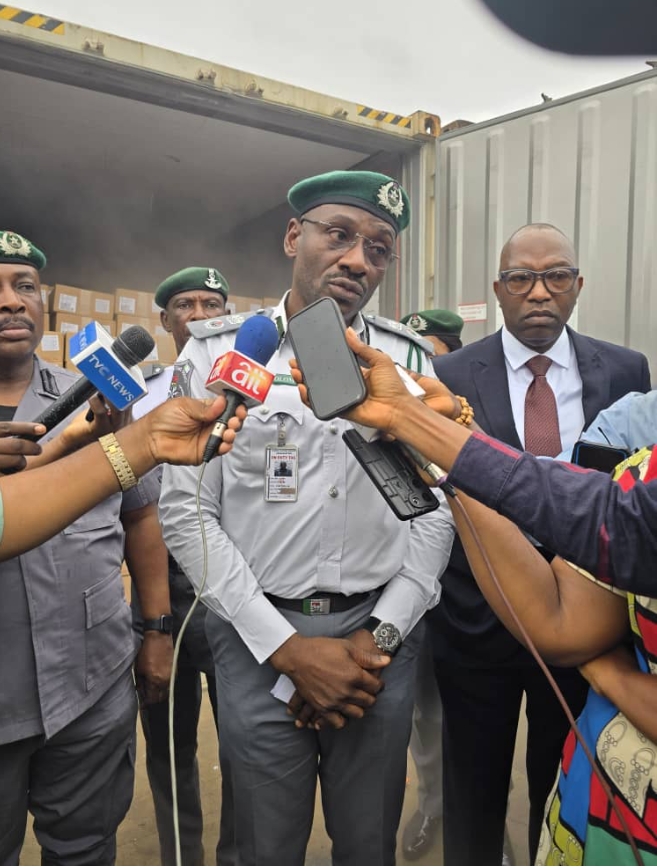Maritime Agencies
Oyetola Opens LIMWEEK 2024, Harps On Port Efficiency and Safety
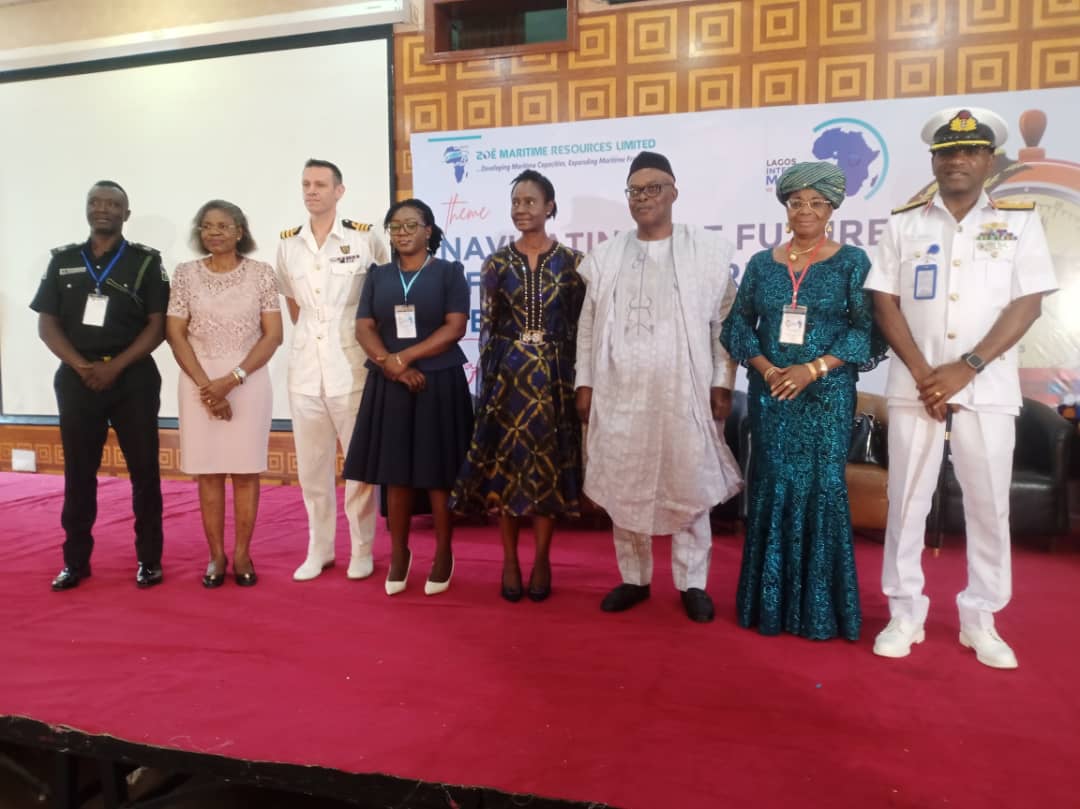
By Izuchukwu Ozoemena
Nigeria’s Marine and Blue Economy Minister, His Excellency Adegboyega Oyetola says in the maritime world, port efficiency and safety are critical components that can never be overlooked while discussing economic growth, trade and investment.
The Minister stated this in Lagos, Tuesday, while declaring open the 2024 edition of the Lagos International Maritime Week (LIMWEEK) and the Business To-Business Conference and Exhibition with the theme ‘Navigating the Future of Africa’s Marine & Blue Economy – Safety First.’
Improvement in safety and ports efficiency, he explained, top the chart on the responsibilities President Bola Tinubu handed to him to achieve as Minister.
The Minister, who was represented by Mr Chinedu Mbam, Legal Director in the Ministry, added that government was fully committed to drive the modernisation and improvement of the ports and maritime infrastructure.
By upgrading the nation’s ports to global standards, he noted, Nigeria will position herself to become a leader in international maritime trade since ports serve as gateway to prosperity.
“We understand that port efficiency and safety are not options; they are imperatives for unlocking the full potential of the blue economy. This is significant because safety remains the cornerstone upon which all maritime operations and business success rest.”
Through key safety initiatives such as the Deep Blue Project, he explained, Nigeria and, indeed the Gulf of Guinea, have achieved reasonable reduction in maritime crimes such as piracy, sea robbery and smuggling.

Mrs Sofiye Uzor (Centre) receiving the Award on behalf of Engr Greg Ogbeifun.
In his contribution, the Lagos Star Commissioner of Police acknowledged his responsibility to secure the maritime domain, including the intricate inland waterways crucial to Nigeria’s economy and Africa’s broader maritime sector. “The Gulf of Guinea, as many of us are aware of, is both a region rich in resources and a key artery for global maritime trade also faces persistent security challenges. The Nigeria Police, through its Maritime Command, has played a pivotal role in securing our maritime domain. Our mandate extends beyond merely patrolling the waterways. We work hand-in-hand with other national and international agencies to protect vital assets, combat piracy and ensure that our marine environment is safe and secure for all stakeholders.”
The Police boss who spoke through Chief Superintendent of Police Segun Falemara said as a matter of routine, the Police collaborates with NIMASA and other critical stakeholders in joint operations to reduce maritime crimes.
“The Marine Police deploys advanced surveillance techniques, leveraging human intelligence and technological solutions to monitor criminal activities along the waterways.”
“Through regional and international partnerships, we ensure our officers are well trained to address emerging maritime threats and security challenges.”
To achieve reasonable security in the Gulf of Guinea, he suggested a coordinated effort from the component littoral states and international partners.
Nigeria, he recalled, has been at the forefront of fostering regional collaboration to ensure a safer maritime environment.
“Some of these include the AGWE Project and the SWAIM SAR Project.” The AGWE Project anchored by the Interpol is a collaborative programme of five West African states aim at training, mentoring and providing equipment for boosting maritime security while SWAIM (Support to West African Integrated Maritime Security) have enhanced the search-and- rescue capabilities in the Gulf of Guinea.
“These initiatives have improved the region’s ability to swiftly respond to maritime emergencies and criminal activities, fostering safety on our waters”. He explained that the United Nations Office on Drugs and Crime has been invaluable in supporting Nigeria’s efforts to combat piracy and armed robbery at sea.
“Through UNODC, the Danish government has funded training programmes that have equipped our offices with Visit, Board, Search and Seizures (VIBSS) procedures in conjunction with the Nigerian Navy to combat illegal activities at sea.
On the proliferation of dangerous materials, he said that partnering with the International Atomic Energy Agency (IAEA) and the US International Counter-proliferation Programme, Nigeria has worked to prevent the smuggling of hazardous materials and weapons of mass destruction into the Gulf of Guinea. This is a critical step towards ensuring that the blue economy is not compromised by illicit activities that would have devastating environmental and security consequences.
The Suppression of Piracy and Other Maritime Offences Act, 2019, he said, has significantly strengthened Nigeria’s legal framework for tackling piracy and other maritime crimes. “It aligns our national laws with international frameworks and provide the necessary legal backing for prosecuting offenders in Nigeria.”
Through the Harmonized
Standard Operating Procedures (HSOPs), efforts are on to ensure that regional maritime security agencies adhere to harmonized SOPs, ensuring a “legal finish” in prosecuting maritime offenders.
Nigeria participates actively in national and regional maritime security conferences such as the Yaounde Architecture for Maritime Security which facilitates coordination between West and Central African states. Mentoring programmes including training supported by international partners such as the US and European Union have played a key role in improving Nigeria’s operational capabilities. “The Nigeria Police also contributes to the 2050 Africa’s Integrated Maritime Strategy (2050 AIM Strategy), comprehensive, concerted, coherent and coordinated approach that improve maritime conditions with respect to environmental and socio-economic development as well as the capacity to generate wealth from sustainable governance of Africa’s blue economy.”
The Police boss assured Nigeria’s commitment to the development of her blue economy through fostering safety and security across her maritime domain.
In his intervention from the perspective of the British Royal Navy, Commander Daniel Waskett, SO2 Marine, disclosed the UK strategy which is to establish long-term and mutually-beneficial partnerships with African nations to build on shared interests for safer, healthier and more prosperous future for all. However, like many nations committed to ensuring a free, secure global common maintenance of international rules-based order and supporting democracy, he stated, the UK is experiencing a time of increased operational demand the Royal Navy is deploying globally at a scale unprecedented for many years.
“Destroyers and Frigates are protecting shipping in the Red Sea to ensure trade can continue freely.”
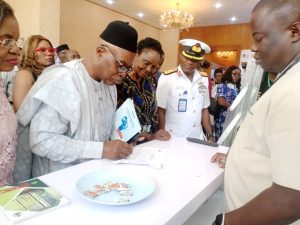
Highlight of the event, among others, was the conferment of a lifetime achievement award on Engr Greg Ogbeifun, Chairman, Starzs Marine and Engineering Co Ltd.
Customs
Ogun 1 Customs Hosts FAED 2026, Highlights Gains of Cross-Border Cooperation, Economic Empowerment and Entrepreneurial Development.
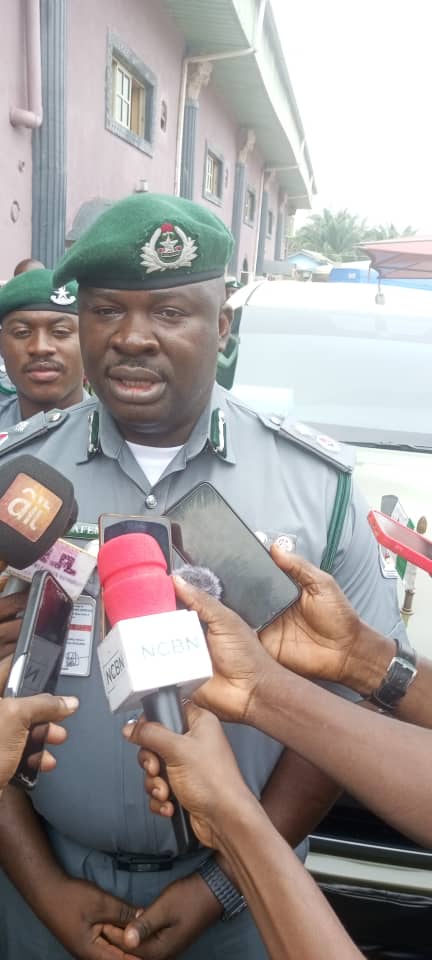
By Izuchukwu Ozoemena
The Acting Customs Area Controller (CAC), Ogun Area 1 Command of the Nigeria Customs Service, Deputy Comptroller O.O.Afeni says the Festival of Arts For Economic Development (FAED) continues to reflect a shared understanding that sustainable border management goes beyond enforcement to encompass cross-border cooperation, economic empowerment and entrepreneurship development within the border communities.
Deputy Comptroller Afeni spoke at the Idiroko Border, Thursday, while declaring open the international colloquium to mark the 5th edition of the Festival of Art for Economic Development to which the Nigeria Customs Service is a strategic partner.
He said: “The theme, ‘Rebranding Borderline Communities through Creative Empowerment and Entrepreneurship,’ aligns with the Nigeria Customs Service’s commitment to supporting legitimate trade, encouraging value addition, and promoting small-scale enterprises as drivers of economic growth and border stability.
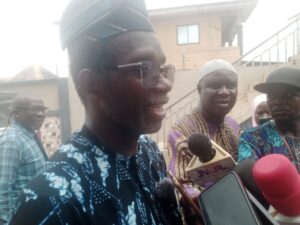
Dr Bonny Abisogun Botoku, Executive Producer, FAED.
He acknowledged the important role of the Nigeria–Benin Inter-Border Forum, under the leadership of its Permanent Secretary, Dr. Bonny Abisogun Botoku in advancing preventive diplomacy, structured dialogue and operational cooperation between Nigeria and the Republic of Benin.
”Through the empowerment programmes and entrepreneurship initiatives embedded in this Festival, we see practical pathways to reducing illicit activities, strengthening lawful commerce, and fostering inclusive economic opportunities for our people.”

Deborah Chiamaka Nwangene, one of the graduating trainees.
”The Nigeria Customs Service remains committed to partnerships that promote peaceful borders, resilient economies and sustainable regional integration.”
During a brief press chat, Comptroller Afeni spoke about enforcing government fiscal policies, saying that this must not be by force.
”The citizens must be made to know the reasons we are here. This is a way of showing the communities that we care about them. You can see that we have trained some people in the art of garri- making painting tye and dye (adire), etc. It’s a way of empowering the community.”
On suggestions that the seminar is capable of deepening cordial relationship between Benin and Nigeria, the CAC could not agree less.
”It is the fifth edition. It has been a situation we see the succeeding version getting better than the previous one. Today, I signed many certificates of people graduating. We’re not just training them; we’re empowering them so that we take them off the smuggling realm and make them better citizens.”
In his presentation, the Executive Producer of the Festival, Dr Bonny Abisogun Botoku described it as more than an event.
”It is a movement. It is a statement of belief—that border communities are not problems to be managed, but potentials to be unlocked.”
He recalled that for too long, border communities across Africa have been spoken about only in the language of risks exemplified in smuggling, insecurity, informality and marginalization.
”But those of us who live and work at the borders know a deeper truth. Borders are not just lines on maps. They are meeting points of culture, gateways of trade,
and spaces of shared history.

Sample of garri processed and packaged by a trainee.
”The Nigeria–Benin border is not a dividing line—it is a shared civilization. What we are doing through this Festival is to change the story from suspicion to trust, from survival to enterprise,
from isolation to integration.
Contrary to the widely-held belief that culture only concerns entertainment, he explained, culture is power, identity and economic capital.
”Through art, music, fashion, crafts, food systems, and storytelling, communities rediscover pride, cohesion, and voice.
Culture becomes a language of peace, dialogue, and diplomacy—especially in border spaces where differences must be managed with wisdom.
”This Festival deliberately places culture at the center of development, not at the margins.”
Distinguished guests at the event included the Onitaege of Itaege, HRM Oba Matthew Ademola Abisoye and other respected traditional rulers, government officials and representatives of security agencies. Others were partners from the Republic of Benin, artists, cultural practitioners and trainees.
Maritime Agencies
We’re Ever Proactive In Intercepting Prohibited, Falsely Declared Goods, says Controller Onyeka.
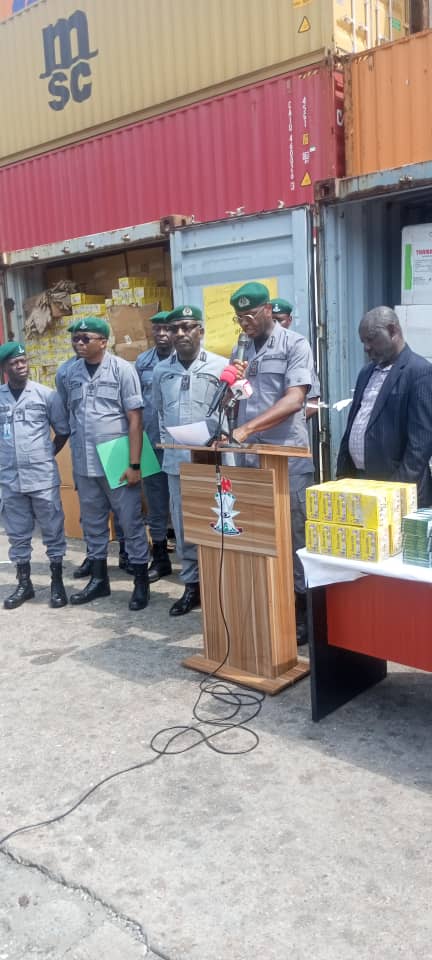
By Izuchukwu Ozoemena
In line with the core mandate of the Nigeria Customs Service, the Tincan Island Port Command is ever proactive in intercepting prohibited and falsely declared goods even as it remains committed to facilitate legitimate trade while contributing significantly to revenue generation.
The falsely declared goods include controlled pharmaceuticals, arms and ammunition, narcotics and other items capable of undermining public safety, security and stability.
The Customs Area Controller (CAC), Comptroller Frank Onyeka stated this in Lagos, Friday, while formally handing over three (3) units of 20 ft containers containing expired pharmaceutical products to the National Food and Drug Administration and Control (NAFDAC) for appropriate regulatory action.
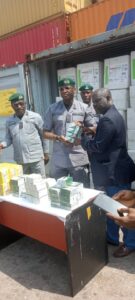
”The containers include two units with numbers PONU031958/6 and MSKU 711656/0 which were found to contain expired Tramadol tablets,” Onyeka announced.
”These consignments were thoroughly examined and the result revealed that the first container contained 86 cartons of Vingil Tramadol BP 50 mg while the second container held 250 cartons of the same expired Tramadol product”.
”The third container with number MSKU413519/1 was found to contain 370 cartons of expired Declofenac Sodium BP 50 mg tablets without a valid NAFDAC registration number, making the consignment illegal and dangerous for public use.”
Beyond these seizures, he explained, the Tincan Command has continued to record notable achievements in recent times through intensified cargo examination, improved intelligence gathering and sustained enforcement operations. These achievements are the result of deliberate strategies anchored on discipline, integrity and strong inter -agency collaboration.
He showed special appreciation to the operatives of NAFDAC for their consistent cooperation.
”Our synergy has continued to yield positive results particularly in ensuring that fake, substandard and expired drugs are intercepted before reaching the Nigerian populace.”
He equally commended officers and men of the Command for being resilient and committed to duty, a development that has continued to strengthen the credibility and operational effectiveness of the Command.
”Furthermore, I express our sincere appreciation to the Comptroller-General of Customs, Bashir Adewale Adeniyi, PhD, MFR, psc (+) for his purposeful leadership and strategic reforms which have empowered our operations.”
The CAC later handed over the prohibited pharmaceuticals to Mr Kareem Taiwo Adekunle, the Chief Regulatory Officer (Investigation and Inspection Directorate), NAFDAC, Apapa.
Maritime Agencies
Zone ‘A’ Coordinator, Mohammed Babandede, Visits Apapa Command, Commends Officers’ Sterling Performance.

By Izuchukwu Ozoemena
Officers and men of the Apapa Customs Command have received a special commendation for maintaining an exceptional performance in revenue generation, anti-smuggling operations and trade facilitation throughout 2025.
Mohammed Babandede, Assistant Comptroller-General of Customs (ACG) and Zonal Coordinator, Zone ‘A’ of the Nigeria Customs Service handed down the commendation during his familiarization visit to the Command, Thursday.
Chief Superintendent of Customs, Isa Sulaiman, the image maker of the Apapa Customs Command disclosed this in a press release.
Addressing officers and men during the visit, the image maker stated, the Zonal Coordinator explained that the purpose of his coming was to acknowledge the operational challenges faced by the Command, appreciate its notable achievements and further boost the morale of personnel who have consistently surpassed expectations, particularly in revenue collection where the Command exceeded its annual target.
”The ACG also lauded the Command’s sustained anti-smuggling efforts, especially the significant seizures of narcotics and other illicit substances including cocaine and tramadol, describing these interceptions as critical contributions to national security, public health and societal safety. ”
Effective enforcement, the ACG emphasized, remains fundamental to creating a secure environment for legitimate trade to thrive.
While noting that the core responsibilities of the Service extend beyond revenue generation to include national security, public safety and trade facilitation, the Zonal Coordinator commended the Apapa Command for its effective inter-agency collaboration. He urged officers to deepen cooperation with sister agencies, particularly in the deployment and promotion of trade facilitation tools that have positioned the Service at an upper-class operational rating.
The Zonal Coordinator further stressed the importance of integrity, reputational management, mentorship and capacity building within the Command. He urged senior officers to transfer knowledge and experience to younger officers while also drawing attention to the importance of officers’ welfare and health, disclosing that drug tests would be conducted across Commands. He advised officers to remain health-conscious for effective service delivery.
In his remarks, the Customs Area Controller, Apapa Area Command, Comptroller Emmanuel Oshoba, expressed appreciation to the Zonal Coordinator whose February 5 visit was motivating and timely. He reaffirmed the Command’s commitment to sustaining its performance in revenue generation, enforcement, trade facilitation, inter-agency cooperation and ethical conduct in strict adherence to the Nigeria Customs Service Act, 2023 and the policy thrust of the Comptroller-General of Customs, Dr Adewale Adeniyi.
-

 Customs3 weeks ago
Customs3 weeks agoKLT Customs Surpasses 2025 Revenue Target By a Wide Margin, Clamps Down on Expired Imports.
-

 Customs2 weeks ago
Customs2 weeks agoFreight Forwarders Warn FAAN To Halt New Charges In Airport Cargo Operations or Risk Rumble in the Sector .
-
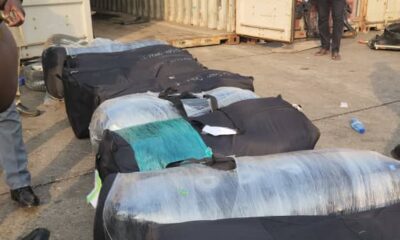
 Maritime Agencies3 weeks ago
Maritime Agencies3 weeks agoWAR AGAINST KILLER DRUGS: Apapa Customs, NDLEA Collaborate To Nab Huge Quantity of ‘Canadian Loud’.
-

 Maritime Agencies3 weeks ago
Maritime Agencies3 weeks agoOGUN AREA 1 CUSTOMS: Suspected Armed Drug Traffickers Mount Barricades, Attack Officers. Two Personnel Critically Injured.
-

 Customs3 weeks ago
Customs3 weeks agoLekki Deepsea Port: The Success Story of the Nigerian Ports Authority.
-

 Customs2 weeks ago
Customs2 weeks agoPTML Customs Hands Over Seized Arms and Ammunition, Collects N44.06bn in January.
-
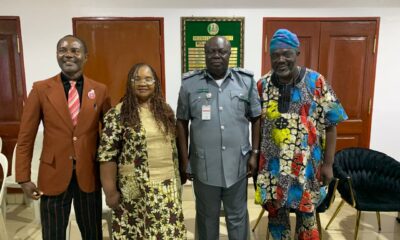
 Maritime Agencies3 weeks ago
Maritime Agencies3 weeks agoSeme Customs Raids Hideouts, Impounds 200 Bags of Smuggled Rice, Collects N2bn 3 Weeks into 2026.
-
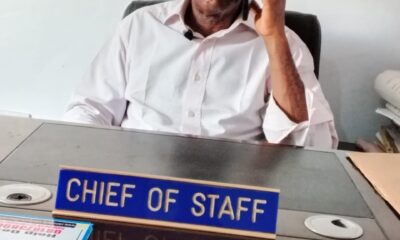
 Maritime Agencies3 weeks ago
Maritime Agencies3 weeks agoNAGAFF Compliance Team Set to Relaunch for Stronger Engagement, Enforcement.

























